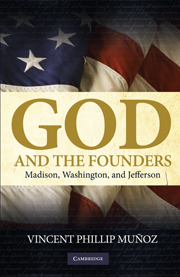Book contents
- Frontmatter
- Contents
- Acknowledgments
- Introduction: The Founders, Religious Freedom, and the First Amendment's Religion Clauses
- PART I THE FOUNDERS' CHURCH-STATE POLITICAL PHILOSOPHIES
- PART II THE FOUNDERS AND FIRST AMENDMENT RELIGION CLAUSES
- Conclusion: The Founders and Church-State Jurisprudence
- Appendix A “Memorial and Remonstrance against Religious Assessments” by James Madison, 1785
- Appendix B A Bill “Establishing a Provision for Teachers of the Christian Religion” by Patrick Henry, 1784
- Appendix C A Bill for Establishing Religious Freedom in Virginia by Thomas Jefferson, 1777
- Index
Introduction: The Founders, Religious Freedom, and the First Amendment's Religion Clauses
Published online by Cambridge University Press: 05 June 2012
- Frontmatter
- Contents
- Acknowledgments
- Introduction: The Founders, Religious Freedom, and the First Amendment's Religion Clauses
- PART I THE FOUNDERS' CHURCH-STATE POLITICAL PHILOSOPHIES
- PART II THE FOUNDERS AND FIRST AMENDMENT RELIGION CLAUSES
- Conclusion: The Founders and Church-State Jurisprudence
- Appendix A “Memorial and Remonstrance against Religious Assessments” by James Madison, 1785
- Appendix B A Bill “Establishing a Provision for Teachers of the Christian Religion” by Patrick Henry, 1784
- Appendix C A Bill for Establishing Religious Freedom in Virginia by Thomas Jefferson, 1777
- Index
Summary
First Amendment religion jurisprudence may have reached the height of its incomprehensibility on the last day of the Supreme Court's 2004 term. Faced with two separate cases involving public displays of the Ten Commandments, the Court found postings of the Commandments in Kentucky courthouses unconstitutional but ruled a Ten Commandments monument on the grounds of the Texas state capitol constitutional. In the two cases, the nine justices issued ten separate opinions totaling 140 pages to explain their different positions. With one exception, every opinion included significant claims about the intentions of the Founding Fathers, and Justice Stephen Breyer's opinion – the only one that did not discuss the Founders – cited Tocqueville. Despite their common reliance on history, the ten opinions invoked at least four different tests to determine the outcomes of the cases – the “Lemon” test, prevention of “civic divisiveness” along religious lines, no “endorsement,” and no “legal coercion” – a disagreement that reflected the justices' divergent interpretations of the Founders. David Souter, who wrote the majority opinion in the case that struck down the courthouse displays, claimed that the Founders' intentions made state-sponsored postings of the Ten Commandments unconstitutional. Looking at the same history, Antonin Scalia and Clarence Thomas reached the opposite conclusion.
The Court's confusing decisions regarding the Ten Commandments are emblematic of its church-state jurisprudence. For more than sixty years, the Constitution's protection of religious liberty has vexed the judiciary, spawning case law mired in bad history, unpersuasive precedents, and incongruous rulings.
- Type
- Chapter
- Information
- God and the FoundersMadison, Washington, and Jefferson, pp. 1 - 8Publisher: Cambridge University PressPrint publication year: 2009



